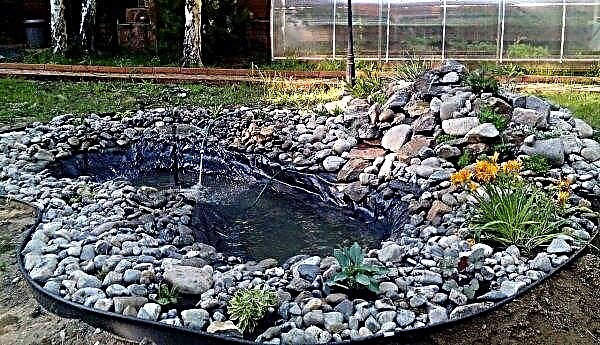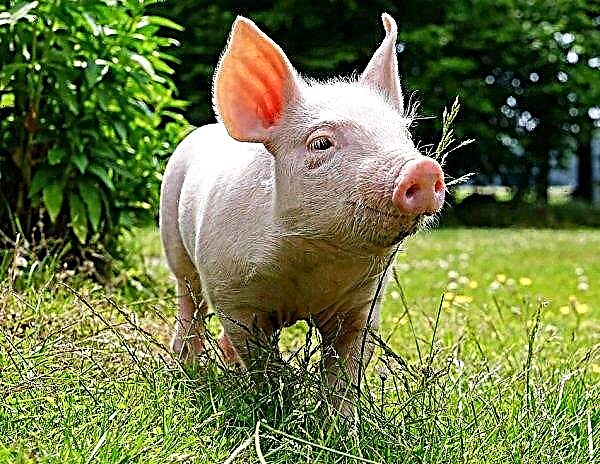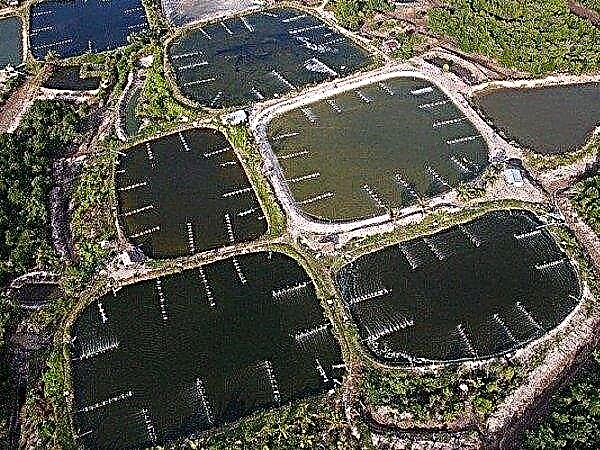During breastfeeding (HB), a woman needs to carefully monitor her diet, including only healthy and hypoallergenic foods. One of them is lentils, which contain many vitamins, protein and trace elements. The chemical composition of this bean crop, the features of its effect on the body of a nursing mother and child, as well as the benefits and harms of lentils, are further discussed in the article.
Chemical and vitamin composition of lentils
Lentils have a rich chemical composition. It contains a high percentage of protein and fiber, as well as other beneficial substances that are necessary for the normal functioning of the body.
Did you know? The shape of lentil grains resembles an optical lens. In Latin, the name of the product sounds like “lens” and means “lens”.
The nutritional value of 100 grams of lentils is presented below:
- calorie content - 295 kcal;
- proteins - 24 g;
- fats - 1.5 g;
- carbohydrates - 46.3 g;
- water - 14 g;
- dietary fiber - 11.5 g;
- ash - 2.7 g.

In addition to its high energy value, lentils are a true repository of vitamins and minerals. Its composition includes:
- vitamins A, B1, B2, B4, B5, B6, B9, C, E, H, K, PP - ensure the normal functioning of organs;
- macrocells (calcium, potassium, silicon, magnesium, sodium, sulfur, phosphorus, chlorine) - form the structure of various tissues and internal organs in the human body;
- trace elements (aluminum, boron, vanadium, iron, iodine, cobalt, lithium, manganese, copper, molybdenum, nickel, rubidium, selenium, strontium, titanium, fluorine, chromium, zinc, zirconium) - participate in the regulation of all vital functions in the body;
- carbohydrates (starch, sucrose) - are energy carriers and satisfy the body's need for calories;
- essential amino acids (arginine, valine, histidine, isoleucine, leucine, lysine, methionine, threonine, tryptophan, phenylalanine) - can be obtained only from the outside and participate in the synthesis of protein molecules;
- essential amino acids (alanine, aspartic acid, glycine, glutamic acid, proline, serine, tyrosine, cysteine) - participate in muscle formation and metabolism;
- saturated fatty acids - are involved in the formation of cells and provide the human body with energy;
- polyunsaturated fatty acids (Omega-3, Omega-6) - help prevent the development of certain diseases and provide good health.

Can I use while breastfeeding
Due to its high protein content and beneficial chemical composition, lentils help a person quickly recover strength after physical exertion and provide him with sufficient energy.
Important! The single rate of use of lentils for breastfeeding should be no more than 25 g of dry cereal, and it can be eaten once every 2-3 days.
After childbirth, a woman’s weakened body is especially in need of nutrients, and a growing baby needs protein, macronutrients and vitamins, which he can get only from mother’s milk. therefore to eat lentils to a woman during lactation is not only possible, but also necessary. In this case, it is necessary to observe the measure in the use of this product and to know what effect it has on the mother and child. About all this - later in the article.

Effect on Lactation
All products that a woman eats during lactation affect the taste and composition of breast milk.
- In a moderate amount, lentils are recommended for use by lactating women, as it helps to establish proper breastfeeding:
- enriches breast milk with necessary vitamins and useful substances that are transmitted to the child;
- beneficial effect on the mother’s nervous system, helping to overcome postpartum depression;
- contributes to the rapid recovery of a woman's body after suffering physical exertion.
 Thanks to the listed qualities of lentils, a woman feels better during lactation, which has a beneficial effect on the production of breast milk
Thanks to the listed qualities of lentils, a woman feels better during lactation, which has a beneficial effect on the production of breast milk
Influence on the child
A newborn baby is growing rapidly, so his body needs vitamins and macronutrients. In the first months of a baby’s life, you can only feed it with mother’s breast milk, the beneficial composition of which depends entirely on the diet of the nursing woman. Eating lentils during lactation improves the characteristics of milk, so this product has a positive effect on the baby.
Important! During breastfeeding, a woman is recommended to include lentils in her menu only after the child is 3 months old and his digestive system is sufficiently formed.
- The list of lentils that are beneficial for the infant is presented below:
- stimulates active growth - a high percentage of protein contributes to the normal development of the skeleton, muscles and the whole body of the child;
- strengthens the immune system - vitamins contained in beans make the baby less susceptible to viruses and infections;
- normalizes the nervous system;
- beneficial effect on the cardiovascular system - the product contains a lot of potassium, necessary for the normal functioning of the heart and strengthening the walls of blood vessels;
- prevents anemia - the culture contains a lot of iron, which increases the level of hemoglobin in the baby’s blood;
- gently cleanses the body - fiber present in beans provides the elimination of toxins and prevents the occurrence of constipation.
Despite the listed positive qualities of the product, it it can cause painful colic, digestive upset, and in some cases, food allergies. Therefore, during breastfeeding, the mother should introduce lentils into her diet gradually, observing the child’s reaction to this food.
The harmful properties of the product and a list of contraindications are discussed further in the article.
The benefits and harms of the product
The beneficial effect of lentils on the human body is due to the rich chemical composition. Moderate consumption of beans helps prevent the development of many serious diseases, and also improves overall well-being.
- The main beneficial properties of lentils are listed below:
- helps to restore muscle tissue after physical exertion;
- stimulates blood circulation, facilitating access of oxygen to all organs;
- strengthens the walls of blood vessels, prevents the formation of blood clots;
- normalizes blood sugar;
- tones the body, helping to get rid of chronic fatigue;
- stimulates the brain and improves concentration;
- promotes activation of metabolic processes;
- normalizes the functioning of the digestive system;
- removes toxins and harmful substances from the body;
- contributes to weight loss, causing a prolonged feeling of satiety;
- strengthens bones and promotes proper skeleton formation;
- beneficial effect on the skin condition, accelerates the healing of injuries and wounds;
- prevents the development of cancerous tumors;
- increases hemoglobin levels and helps in the fight against anemia;
- improves mood, reduces stress level;
- reduces the risk of fetal abnormalities during pregnancy;
- normalizes hormonal levels;
- strengthens the immune system and increases the body's resistance to infections.
- Eating excessive amounts of lentils can cause negative consequences, accompanied by such phenomena:
- bloating and heaviness in the stomach - beans contain a lot of fiber, which is digested for a long time in the stomach;
- painful intestinal cramps - the digestion of grains of this culture is accompanied by increased gas formation in the intestine;
- accumulation of slag in the body - a large portion of the product cannot be effectively digested and begins to decompose in the stomach, releasing toxic substances;
- kidney stone formation - the plant contains lysine, which tends to accumulate in the body and provoke the development of gallstone disease;
- numbness of arms and legs - arises as a result of a high content of potassium in beans, which affects the functioning of the cardiovascular system;
- gout development - the product contains purine, which promotes the accumulation of uric acid in the body.

Contraindications
In some cases, lentils should not be eaten so as not to cause serious harm to their health. Dishes from this product can aggravate the course of some diseases, therefore, if there are abnormalities in the body, you must first consult your doctor.
Important! Before eating lentils, you need to sort out the cereals and pre-soak it in water for several hours, so that the grains are cooked faster.
Before you enter this product into your diet, you need to carefully study the list of contraindications.
- These include:
- flatulence - getting into the stomach, croup provokes increased gas formation and can cause painful colic in the mother and baby;
- the presence of kidney or bladder stones - the use of the product can aggravate the disease and cause the formation of new stones;
- intestinal dysbiosis - lentils are digested longer than other products, which creates an additional burden on the body in case of digestive disorders and can cause stool upset;
- chronic joint diseases - the use of lentils leads to an increase in the concentration of uric acid in the body, enhancing pain in the joints;
- individual product intolerance - manifests itself in the form of a rash, itching, or redness of the skin and occurs in people who have an increased tendency to allergies.

Lentils help to make the feeding diet of a nursing mother more diverse and balanced, and the beneficial substances contained in it are transmitted to the baby along with breast milk and strengthen its growing body. Using the information on the useful and harmful properties of this product, listed in this article, you can extract the maximum benefit from boiled beans and correctly include lentil dishes in the menu during lactation.












